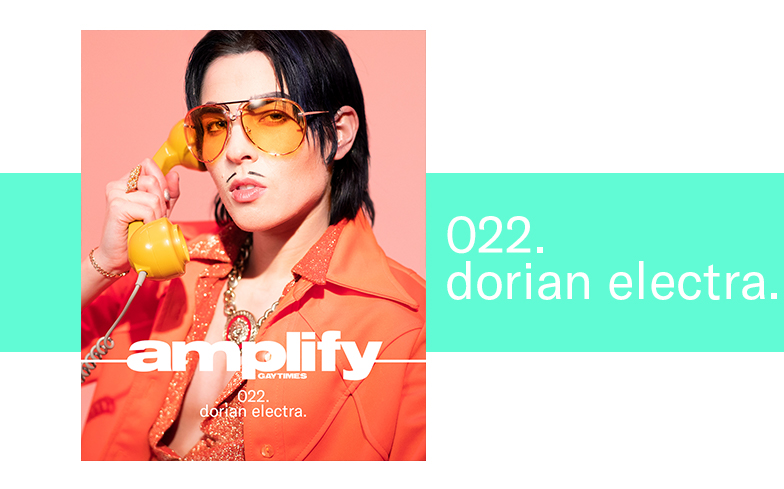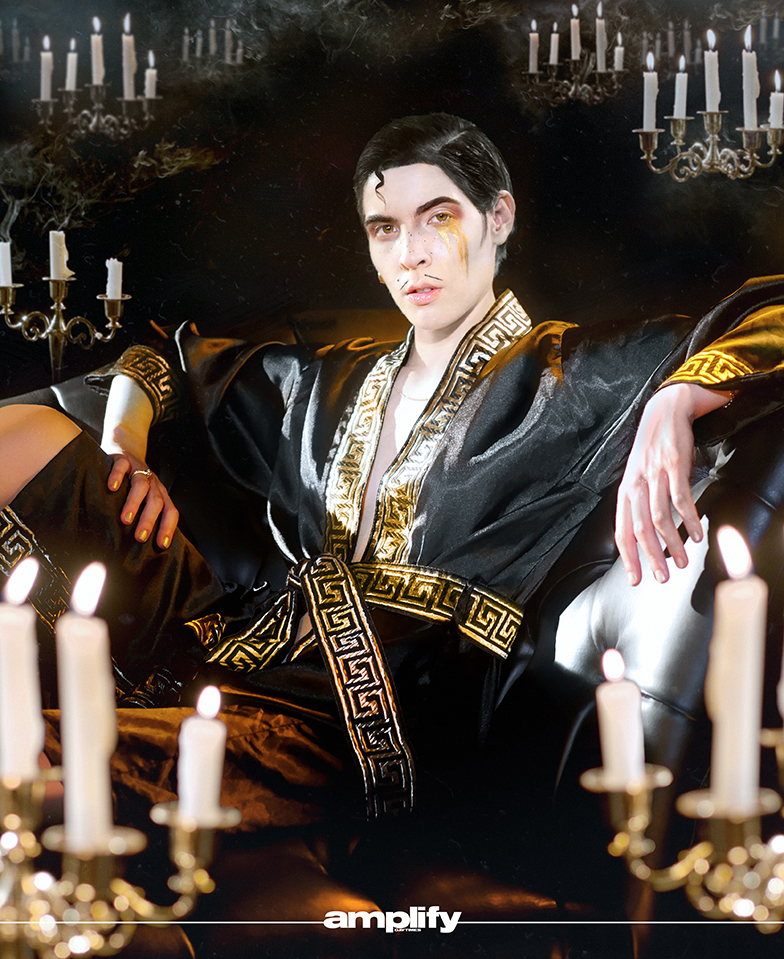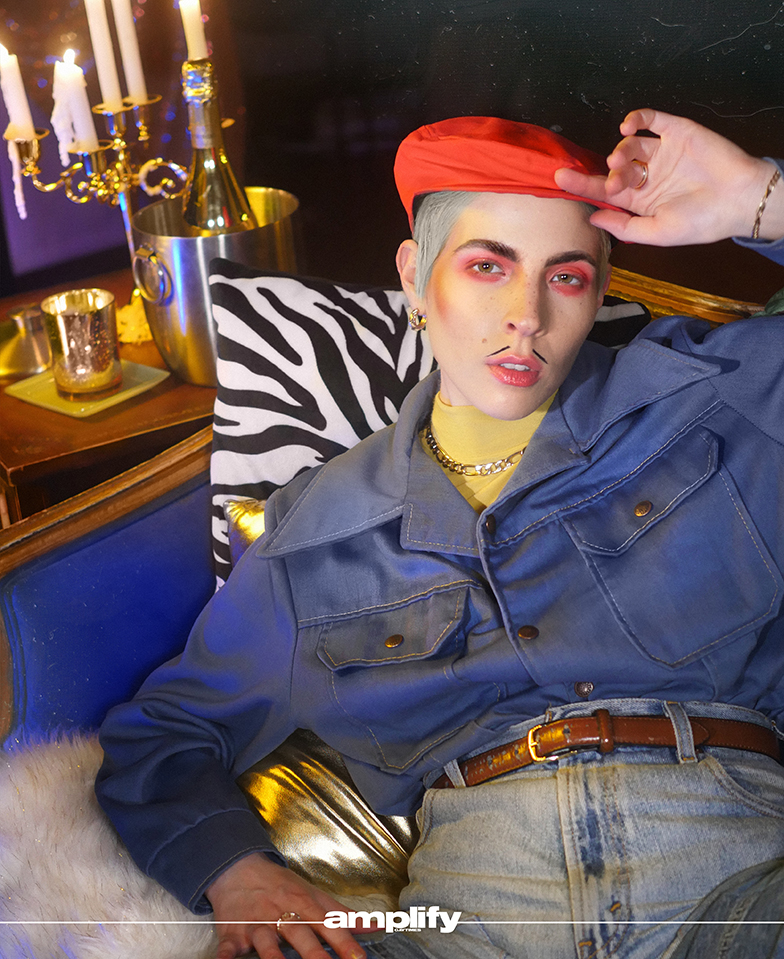
Dorian Electra is the embodiment of camp. No, not the kind of camp you used to watch with your parents on Saturday night TV, but a forward-thinking, high-fashion kind of camp – all while never taking themselves too seriously.
Imagine what this year’s Met Gala extravaganza could have been had everyone got the memo, and that’s pretty much what Dorian oozes in every aspect of their artistry. It’s evident in the effortlessly cool Man To Man music video, which sees them rock high-waisted PVC bottoms and a red leather jacket, accompanied by slicked-back blue hair and a pencil-thin moustache. It’s there in Daddy Like, an ode to sugar daddies with a carousel of power suits in bold hues decorated by fur trims, oversized sunglasses and glittery platform boots. So it’s only fitting that Dorian’s long-overdue debut album would be named Flamboyant, a word that – as we found out when we received an unexpected lesson in etymology from the singer-songwriter – has a lot more history than you may realise.
“In researching the word, I just found it so powerful and interesting. It originally comes from French gothic architecture, to describe a really intricate and colourful flame-like design. Then it came to mean something bright and colourful that you couldn’t look away from, and then it came to be used as a euphemism for someone whose personality was like that, and then it became a euphemism for effeminate, and then of course it became a euphemism for gay,” they explain. “I think I first came across the word when I was reading about Oscar Wilde. Any biography about him will definitely contain the word flamboyant. I just think it’s so cool that there’s this derogatory word that people have used in a bad way, that has this queer history, and we’re now reclaiming that word to mean proud, and loud, and out there.”
Much like the word queer, a slur which has slowly been adopted by LGBTQ people to take away its power and turn it into something beautiful, terms like camp and flamboyant have seen an increase in media attention over recent years, largely thanks to phenomenons like RuPaul’s Drag Race, which have seen art forms associated with camp gradually work their way into the mainstream. “I think it’s so cool that camp has come into the public consciousness so much lately,” Dorian explains. “Once people understand the queer history of camp and this whimsical self-awareness that comes from being outside traditional social norms, and using humour to get by, and then also taking down certain norms about gender and sexuality because they are inherently silly, but the rest of the world doesn’t see it that way, I think embracing that history and understanding its queer roots is really important for moving forward with appreciating camp and queerness.”
Of course, we couldn’t talk about camp and flamboyance without addressing this year’s Met Gala, which received mixed responses from fans at home when its Camp: Notes On Fashion theme was severely misinterpreted. Some (mostly queer) artists nailed the delivery, like Billy Porter with his attention-grabbing golden Sun God outfit and Ezra Miller with their optical illusion eye makeup, but most people totally missed the mark. During red carpet interviews, many celebrities – even some who’ve embodied the essence of camp during their career – were bewildered when asked what the word meant to them. In the aftermath, countless articles and thinkpieces emerged attempting to describe what camp truly means. So why do people find it so hard to get it right? “Well it’s interesting, because I feel like a lot of people do get it when they see it, and they enjoy it – that’s why we’ve seen things like Drag Race going mainstream – I just feel like they don’t know how to replicate it,” Dorian muses. “It’s hard to explain what camp is, even if you do get it, it’s definitely hard to put it into words. And then trying to replicate it and put it into a look, that’s really hard to pull off, because it can come off as a very two-dimensional understanding of it.”
Flamboyance isn’t just a visual aesthetic for Dorian, though. The new album is one of the most creative, experimental and flat-out bizarre releases you’ll hear all year. Musical Genius is an assault on the senses, opening with a classical piano before descending into hellish synths and screams; Guyliner, a glittery standout that features more vocal distortions than Cher hit Believe, sounds like a spiritual successor to Charli XCX collaboration Femmebot; while Emasculate sees Dorian beg for the masculine to be “cut right out” of them over grungy S&M beats. If you’re looking for pleasant background listening, you definitely won’t find it here. This is pop music turned up to the extreme, with the kind of addictive hooks you’d hear on the charts but sliced up, stomped on and chucked in a sparkly blender. “I guess I want people to see my stuff, and see me being weird and just being myself and not trying to fit into trends of what’s cool, and hopefully they can feel comfortable being themselves,” Dorian says.
The glue that binds this eclectic collection of songs together is masculinity, specifically the idea of toxic masculinity, which acts as the overarching theme of the album. Unfortunately, it’s a phrase that seems to instill terror or rage in the wider population, with many taking it as an ‘attack’ on men. But, as Dorian explains, challenging these outdated ideals is something that helps all people. “The patriarchy hurts everybody,” they say. “Our social norms value masculinity and violence above compassion, and that’s toxic for our culture as a whole. There’s this long, crazy history of denigrating femininity and queerness, women, and trans people.” Gay men, listen up – you aren’t excluded from this. “In my experience, there was always such a celebration of femininity in the queer community, which was amazing, but that didn’t always resonate with me as an AFAB [assigned female at birth] person who is gender-fluid and is drawn to really masculine things. Within the gay community there is a lot of masculinity, and that’s often criticised for being toxic and misogynistic – in a similar way as the hetero world – where it can all get very masc4masc. So much of toxic masculinity comes from the fear of the feminine or homosexuality, and once that fear is eradicated, I think we’ll have a much healthier view of what masculinity and femininity mean, and also the blurred lines and grey area between that as well.”
We ask if there’s a song on the album that stands out for them. “I would say Adam and Steve for sure,” they reveal. The powerful, almost haunting track took inspiration from religious picketer signs that throw around the old trope, ‘God made Adam and Eve, not Adam and Steve’, and sees Dorian challenge the notion that God’s love is only for a specific type of person. “I wanted to do it in a playful and sexy way, because it’s very homoerotic, it’s kind of this biblical fanfiction narrative about Adam and Steve. There’s a shout out to Madame and Eve at the end of the song, too. Also musically it’s one of my favourites, because it combines these really hardcore metal elements with this religious choral vibe, playing with the history of that traditional church music and reappropriating that for this queer narrative. That to me is really fun.” Inspiration also came from their ex-step-mother, whose religious beliefs have stopped her from embracing Dorian and their art. “This is actually something I haven’t really talked about that much, because my mom and dad are extremely supportive, but my ex-step-mom is very unsupportive and doesn’t even let my younger brothers watch my videos. They live a totally different life out in the country in Texas. She still thinks that what I’m doing is evil and sinful. It’s very different from the rest of my family, and that’s been a huge influence in my life, especially rebelling against that when I was younger. Even within my own family, that makes me realise we still have a long way to go.”
It’s exciting seeing Dorian’s rise, especially as they’re part of a bigger wave of queer artists who are making noise in the music industry, often without the help of major record labels and big-budget promotion. There’s pop princess Kim Petras, a trans singer-songwriter who’s racking up incredible numbers on streaming services; Rina Sawayama, a Japanese-British singer and model who’s gracing fashion magazines and performing at festivals; and Troye Sivan, one of the most successful openly gay artists of his generation. Then there are songwriters like Leland, Jesse Saint John and Justin Tranter, who are crafting massive pop bangers for the likes of Britney Spears and Selena Gomez behind the scenes. Most importantly, they’re all incredibly supportive of each other, frequently collaborating and sharing live stages, providing positive and successful role models for young LGBTQ people that haven’t always existed. It certainly feels like the pop music industry is a much queerer place than it was a decade ago. “I would say this has probably existed in other genres or other time periods, for example the queer punk scene and things like that, but I feel so lucky to be part of a group of specifically queer pop artists that is supporting one another,” Dorian says.
The thread that’s linked all these artists is pop hitmaker Charli XCX. Her two critically-acclaimed (and effortlessly cool) mixtapes, Number 1 Angel and Pop 2, brought together many queer artists, including Dorian, and effectively handed over her platform to the community. If you want to be an ally in the industry, Charli’s a brilliant example to look towards. “She’s brought together so many people,” Dorian gushes. “I met Rina Sawayama through Charli, and I got to work with Mykki Blanco through Charli, and then also getting to meet Kim Petras and Jesse Saint John, all of these people. In a lot of ways, Charli has really been the glue that’s brought us together. She’s made it really cool to have all these people on her albums, and they’re overwhelmingly queer, people like Pabllo Vittar and Christine And The Queens. I feel like everyone that’s in the periphery of that has now started to become friends and collaborators. It’s really cool and she’s a big part of that.” Dorian’s also mindful of using their platform to lift others. At the recent Go West Fest, an LGBTQ festival curated by Charli and Troye, they brought out Quay Dash, a fierce trans rapper from New York, and Pussy Riot, the feminist punk rock band who face both societal and legal discrimination in Russia. “To see all those artists come together in that way is so cool, because it can definitely become a kind of self-congratulatory circle. You’ve got to be aware of what other artists are facing and continue to lift up those more marginalised voices. That’s always the goal.”
It’s easy to exist in a bubble of acceptance and queer celebration, especially in more progressive cities like London and New York – even more so for someone like Dorian, who surrounds themselves with LGBTQ artists and friends. Assuming mainstream success is the goal, we ask if they think the world is ready for an artist like them. “I definitely think about this all the time,” they admit. “On the one hand, having seen so many positive YouTube comments from random people who didn’t know about me before, and due to this algorithm they’ve now seen my videos and reacted well to them – I feel like if I was on a major label and had the budget to get in front of people’s eyes and ears, then I think people would like me. But it’s really a question of, ‘Would I be able to communicate my vision successfully to the people who hold the keys to those marketing budgets and that platform?’ I don’t expect that I’m going to get some major label deal, because I just assume my thing is a little too weird for that at this point, so I don’t wanna be disappointed by that, but I am open to that possibility. And I think it’s really cool seeing people like Troye Sivan and King Princess and Christine And The Queens occupying different spheres of slightly different genres and audience, and being overwhelmingly queer. Seeing them rise is really nice, because I’ve heard artists say, ‘I’ve had industry people say to my face that queer people are not financially viable at this point’. So to have those artists who have some kind of industry backing is important to demonstrate to the people who have the money that there are people out there who want this. Just because it hasn’t been done before, doesn’t mean that people don’t want this now. We can’t always go by the old models. People are tired of that.”
Dorian Electra’s debut album Flamboyant is out 17 July. Tickets for their UK and US dates are available here.
Photography Lance Williams
Words Daniel Megarry





